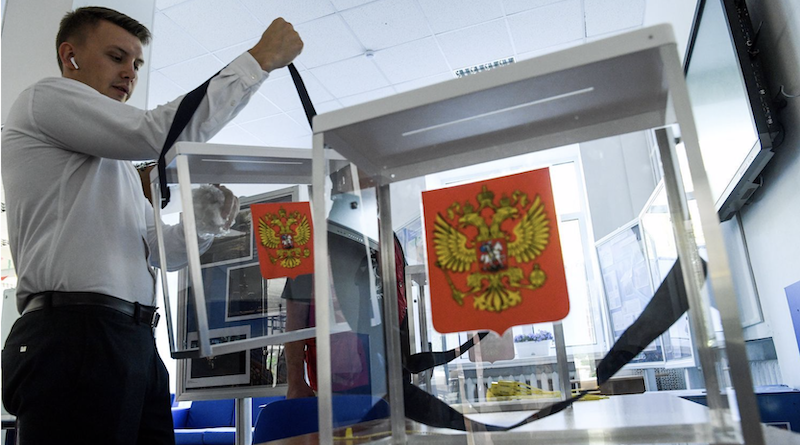Russia’s Future Is Still in the Hands of Putin’s Cronies
By Chris Miller, Assistant Professor of International History at The Fletcher School of Law and Diplomacy at Tufts University
Russia held elections last week amid a now usual backdrop of protests and arrests. Independent monitors reported election-law violations across the country. Universities were alleged to have purged scholars with pro-opposition views in the runup to the vote. Russia’s Internet regulator declared Facebook and Google to have meddled in the election, interfering in “Russia’s sovereign affairs and hindering the conduct of democratic elections.” And the vote was followed by a nationwide police raid on the offices of opposition leader Alexey Navalny’s Anti-Corruption Foundation. Just another election, you might think, in President Vladimir Putin’s Russia.
Many analysts, however, had a different view. The election itself, which selected the 45 members of the Moscow city council as well as local and regional governments across the country, was more competitive than expected. In most regions, the ruling United Russia party won handily, thanks to its domination of the media and other repressive tactics. In Moscow, however, United Russia nearly lost its majority on the city council, winning only 25 of 45 seats.
The regime’s narrow victory in Moscow came despite its decision this summer to ban from the ballot many of the most popular opposition leaders, including the liberal activists Ilya Yashin and Lyubov Sobol, on the bogus grounds that they had not accumulated the necessary number of citizen signatures to register as candidates. Rather than real opposition candidates, the Moscow city council preferred to run an election against the tame parties of the so-called systemic opposition, including the Communists and A Just Russia, which participate in politics but don’t actually try to take power.
The opposition mobilized against the purge of its candidates in two ways. First, over the summer, opposition figures launched the most sustained round of protests that Moscow has seen since 2012. Thousands took to the streets. The government refused to authorize such disruptive activities as reading the constitution to the police. The police responded with bloody beatings.
The opposition’s second strategy was to pioneer a new tactic called “smart voting.” Navalny’s team set up a website which, if you entered your address, would tell you which candidate in your district was most likely to defeat the ruling party’s city-council member. In districts where real opposition candidates had been banned, Navalny’s “smart voting” system recommended a vote for the tame opposition, especially for the Communists. Even the Communists are better than Putin’s hated United Russia, Navalny and his supporters reasoned. Many Moscow voters agreed, and the “smart voting” system was a key reason why United Russia nearly lost control of the Moscow council.
To be sure, Moscow’s city council has only a fraction of the power of the city’s mayor, who was not on the ballot. And winning 20 city council seats is a long way from the winning the presidency. So what does all this electoral maneuvering amount to? As usual with Russian elections, that is no easy question. In democracies, elections decide who rules. In Russia, elections are a test of the political class’s ability to manage the population. The United Russia party has been horribly unpopular for nearly a decade, so perhaps this election will finally convince the Kremlin to ditch it. If it does, though, it will surely replace the old party with one with a new name, but many of the same old faces. And the man at the top certainly isn’t planning to leave.
For the opposition to get closer to real power, something much bigger would have to change. Pussy Riot, the punk group, has returned with a new song and music video in the aftermath of the vote. Titled “1937”—the year of Joseph Stalin’s most murderous purges—the music video features dancers in face masks like those Hong Kong’s protesters use against tear gas. Yet Hong Kong is a reminder of what the Russian protests, at least thus far, are not. In Hong Kong, protests have brought nearly 2 million people to the streets. Moscow’s biggest rallies are rarely 5 percent that size.
The biggest anti-government protests of the Putin era, in 2011 and 2012, brought tens of thousands to the street. If 2 million Muscovites began banging on the Kremlin gates, Putin would start looking for a retirement home in a tropical dictatorship. According to the independent pollster Levada-Center, willingness to participate in a protest has doubled over the past two years. And a majority of Russians agree that the population is becoming increasingly dissatisfied with the government. But Russian protests are unlikely to reach a Hong Kong scale anytime soon. In Hong Kong, protests forced the government to withdraw its hated extradition bill. Many Russians doubt that protests could score a similar success in their country, so they see no reason to take to the streets.
If truly mass protests are unlikely, evidence of dissatisfaction might at least provoke a split in the elite. It is, after all, elite politics that has driven every Russian political shift since the 1917 revolution. It is no longer only the opposition that believes Russia is stagnating. Even regime stalwarts are publishing articles in prominent newspapers accusing the government of mistaking “stability” for “stagnation.”
Amid this summer’s protests, Sergei Chemezov, the CEO of Russia’s biggest defense contractor, who is also a former KGB colleague of Putin’s, told a newspaper that Russia was sunk in a “period of stagnation.” “People are really irritated,” he noted. What to do? “My position as a citizen is that the presence of a sensible opposition is good for any institution, representative assembly, and, in the final analysis, the government. There should be some kind of alternative power which can give clues and signals in this or that direction.” If even former KGB agents are calling for “alternative power,” surely the government’s game is up?
This piece was republished from Foreign Policy.

